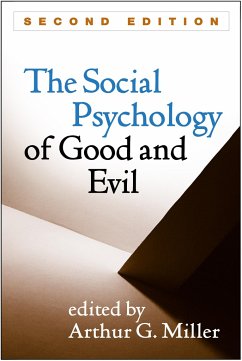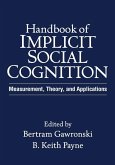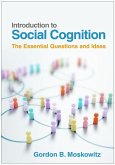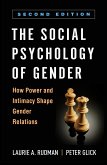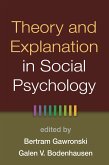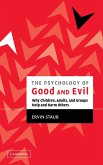Social Psychology of Good and Evil, Second Edition
Herausgeber: Miller, Arthur G
Social Psychology of Good and Evil, Second Edition
Herausgeber: Miller, Arthur G
- Gebundenes Buch
Andere Kunden interessierten sich auch für
![We're Just Good Friends We're Just Good Friends]() Kathy WerkingWe're Just Good Friends46,99 €
Kathy WerkingWe're Just Good Friends46,99 €![Handbook of Implicit Social Cognition Handbook of Implicit Social Cognition]() Handbook of Implicit Social Cognition144,99 €
Handbook of Implicit Social Cognition144,99 €![Introduction to Social Cognition Introduction to Social Cognition]() Gordon B MoskowitzIntroduction to Social Cognition130,99 €
Gordon B MoskowitzIntroduction to Social Cognition130,99 €![The Social Psychology of Gender The Social Psychology of Gender]() Laurie A RudmanThe Social Psychology of Gender95,99 €
Laurie A RudmanThe Social Psychology of Gender95,99 €![Theory and Explanation in Social Psychology Theory and Explanation in Social Psychology]() Theory and Explanation in Social Psychology91,99 €
Theory and Explanation in Social Psychology91,99 €![Good Reasonable People Good Reasonable People]() Keith PayneGood Reasonable People30,99 €
Keith PayneGood Reasonable People30,99 €![The Psychology of Good and Evil The Psychology of Good and Evil]() Ervin StaubThe Psychology of Good and Evil110,99 €
Ervin StaubThe Psychology of Good and Evil110,99 €-
-
-
Produktdetails
- Verlag: Guilford Publications
- 2nd edition
- Seitenzahl: 542
- Erscheinungstermin: 3. Juli 2016
- Englisch
- Abmessung: 236mm x 163mm x 36mm
- Gewicht: 998g
- ISBN-13: 9781462525409
- ISBN-10: 1462525407
- Artikelnr.: 43674732
Hinweis: Dieser Artikel kann nur an eine deutsche Lieferadresse ausgeliefert werden.
- Herstellerkennzeichnung
- Libri GmbH
- Europaallee 1
- 36244 Bad Hersfeld
- gpsr@libri.de
Arthur G. Miller, PhD, is Professor Emeritus of Psychology at Miami University in Oxford, Ohio. Dr. Miller's research and publications have focused on stereotyping and stigma, biases in attribution and social judgment, and judgmental reactions to diverse explanations of evil and violence. He recently coedited a special issue of the Journal of Social Issues: "Milgram at 50: Exploring the Enduring Relevance of Psychology's Most Famous Studies."
1. Introduction and Overview
Arthur G. Miller I. Conceptual Perspectives on Good and Evil 2. The Evolution of Good and Evil
Joshua D. Duntley and David M. Buss 3. Free Will Evolved for Morality and Culture
Andrew E. Monroe
Kathleen D. Vohs
and Roy F. Baumeister 4. Categories
Intent
and Harm
Susan T. Fiske 5. "The Devil Made Me Do It": The Deification of Consciousness and the Demonization of the Unconscious
John A. Bargh II. Harming Others: Contexts
Causes
and Implications 6. Racism among the Well Intentioned: Bias without Awareness
John F. Dovidio
Samuel L. Gaertner
and Adam R. Pearson 7. Understanding Media Violence Effects
Sara Prot
Craig A. Anderson
Muniba Saleem
Christopher L. Groves
and Johnie J. Allen 8. How Dehumanization Promotes Harm
Nick Haslam and Steve Loughnan 9. The Social Psychology of Genocide and Mass Atrocities
Johanna Ray Vollhardt and Maggie Campbell-Obaid 10. Why Are the Milgram Experiments Still So Extraordinarily Famous-and Controversial?
Arthur G. Miller 11. A Social Interaction Approach to Objectification: Implications for the Social-Psychological Study of Sexual Violence
Sarah J. Gervais III. The Self-Concept in Relation to Good and Evil Acts 12. False Moral Superiority
David Dunning 13. Making Relationship Partners Good: A Model of the Interpersonal Consequences of Compassionate Goals
Jennifer Crocker and Amy Canevello 14. Evil Persons or Evil Deeds?: What We've Learned about Incarcerated Offenders
June P. Tangney
Dan V. Blalock
Johanna B. Folk
and Jeffrey Stuewig 15. Dishonesty Explained: What Leads Moral People to Act Immorally
Francesca Gino and Dan Ariely IV. Group Perspectives on Good and Evil 16. Bystanders and Emergencies: Why Understanding Group Processes Is Key to Promoting Prosocial Behavior
Mark Levine and Neil Wilson 17. Remembering Historical Victimization: Potential for Intergroup Conflict Escalation and Conflict Reduction
Nyla R. Branscombe
Michael J. A. Wohl
and Ruth H. Warner 18. Organizations Matter
Arthur P. Brief and Kristin Smith-Crowe 19. Globalization and Terrorism: The Primacy of Collective Processes
Fathali M. Moghaddam
Victoria Heckenlaible
Madeleine Blackman
Sarah Fasano
and Daniel J. Dufour V. The Possibilities for Kindness 20. Benefits and Liabilities of Empathy-Induced Altruism: A Contemporary Review
C. Daniel Batson
Nadia Y. Ahmad
and E. L. Stocks 21. Volunteerism: Multiple Perspectives on Benefits and Costs
Mark Snyder
Allen M. Omoto
and Patrick C. Dwyer 22. The Psychology of Heroism: Extraordinary Champions of Humanity in an Unforgiving World
Zeno E. Franco and Philip G. Zimbardo Index
Arthur G. Miller I. Conceptual Perspectives on Good and Evil 2. The Evolution of Good and Evil
Joshua D. Duntley and David M. Buss 3. Free Will Evolved for Morality and Culture
Andrew E. Monroe
Kathleen D. Vohs
and Roy F. Baumeister 4. Categories
Intent
and Harm
Susan T. Fiske 5. "The Devil Made Me Do It": The Deification of Consciousness and the Demonization of the Unconscious
John A. Bargh II. Harming Others: Contexts
Causes
and Implications 6. Racism among the Well Intentioned: Bias without Awareness
John F. Dovidio
Samuel L. Gaertner
and Adam R. Pearson 7. Understanding Media Violence Effects
Sara Prot
Craig A. Anderson
Muniba Saleem
Christopher L. Groves
and Johnie J. Allen 8. How Dehumanization Promotes Harm
Nick Haslam and Steve Loughnan 9. The Social Psychology of Genocide and Mass Atrocities
Johanna Ray Vollhardt and Maggie Campbell-Obaid 10. Why Are the Milgram Experiments Still So Extraordinarily Famous-and Controversial?
Arthur G. Miller 11. A Social Interaction Approach to Objectification: Implications for the Social-Psychological Study of Sexual Violence
Sarah J. Gervais III. The Self-Concept in Relation to Good and Evil Acts 12. False Moral Superiority
David Dunning 13. Making Relationship Partners Good: A Model of the Interpersonal Consequences of Compassionate Goals
Jennifer Crocker and Amy Canevello 14. Evil Persons or Evil Deeds?: What We've Learned about Incarcerated Offenders
June P. Tangney
Dan V. Blalock
Johanna B. Folk
and Jeffrey Stuewig 15. Dishonesty Explained: What Leads Moral People to Act Immorally
Francesca Gino and Dan Ariely IV. Group Perspectives on Good and Evil 16. Bystanders and Emergencies: Why Understanding Group Processes Is Key to Promoting Prosocial Behavior
Mark Levine and Neil Wilson 17. Remembering Historical Victimization: Potential for Intergroup Conflict Escalation and Conflict Reduction
Nyla R. Branscombe
Michael J. A. Wohl
and Ruth H. Warner 18. Organizations Matter
Arthur P. Brief and Kristin Smith-Crowe 19. Globalization and Terrorism: The Primacy of Collective Processes
Fathali M. Moghaddam
Victoria Heckenlaible
Madeleine Blackman
Sarah Fasano
and Daniel J. Dufour V. The Possibilities for Kindness 20. Benefits and Liabilities of Empathy-Induced Altruism: A Contemporary Review
C. Daniel Batson
Nadia Y. Ahmad
and E. L. Stocks 21. Volunteerism: Multiple Perspectives on Benefits and Costs
Mark Snyder
Allen M. Omoto
and Patrick C. Dwyer 22. The Psychology of Heroism: Extraordinary Champions of Humanity in an Unforgiving World
Zeno E. Franco and Philip G. Zimbardo Index
1. Introduction and Overview
Arthur G. Miller I. Conceptual Perspectives on Good and Evil 2. The Evolution of Good and Evil
Joshua D. Duntley and David M. Buss 3. Free Will Evolved for Morality and Culture
Andrew E. Monroe
Kathleen D. Vohs
and Roy F. Baumeister 4. Categories
Intent
and Harm
Susan T. Fiske 5. "The Devil Made Me Do It": The Deification of Consciousness and the Demonization of the Unconscious
John A. Bargh II. Harming Others: Contexts
Causes
and Implications 6. Racism among the Well Intentioned: Bias without Awareness
John F. Dovidio
Samuel L. Gaertner
and Adam R. Pearson 7. Understanding Media Violence Effects
Sara Prot
Craig A. Anderson
Muniba Saleem
Christopher L. Groves
and Johnie J. Allen 8. How Dehumanization Promotes Harm
Nick Haslam and Steve Loughnan 9. The Social Psychology of Genocide and Mass Atrocities
Johanna Ray Vollhardt and Maggie Campbell-Obaid 10. Why Are the Milgram Experiments Still So Extraordinarily Famous-and Controversial?
Arthur G. Miller 11. A Social Interaction Approach to Objectification: Implications for the Social-Psychological Study of Sexual Violence
Sarah J. Gervais III. The Self-Concept in Relation to Good and Evil Acts 12. False Moral Superiority
David Dunning 13. Making Relationship Partners Good: A Model of the Interpersonal Consequences of Compassionate Goals
Jennifer Crocker and Amy Canevello 14. Evil Persons or Evil Deeds?: What We've Learned about Incarcerated Offenders
June P. Tangney
Dan V. Blalock
Johanna B. Folk
and Jeffrey Stuewig 15. Dishonesty Explained: What Leads Moral People to Act Immorally
Francesca Gino and Dan Ariely IV. Group Perspectives on Good and Evil 16. Bystanders and Emergencies: Why Understanding Group Processes Is Key to Promoting Prosocial Behavior
Mark Levine and Neil Wilson 17. Remembering Historical Victimization: Potential for Intergroup Conflict Escalation and Conflict Reduction
Nyla R. Branscombe
Michael J. A. Wohl
and Ruth H. Warner 18. Organizations Matter
Arthur P. Brief and Kristin Smith-Crowe 19. Globalization and Terrorism: The Primacy of Collective Processes
Fathali M. Moghaddam
Victoria Heckenlaible
Madeleine Blackman
Sarah Fasano
and Daniel J. Dufour V. The Possibilities for Kindness 20. Benefits and Liabilities of Empathy-Induced Altruism: A Contemporary Review
C. Daniel Batson
Nadia Y. Ahmad
and E. L. Stocks 21. Volunteerism: Multiple Perspectives on Benefits and Costs
Mark Snyder
Allen M. Omoto
and Patrick C. Dwyer 22. The Psychology of Heroism: Extraordinary Champions of Humanity in an Unforgiving World
Zeno E. Franco and Philip G. Zimbardo Index
Arthur G. Miller I. Conceptual Perspectives on Good and Evil 2. The Evolution of Good and Evil
Joshua D. Duntley and David M. Buss 3. Free Will Evolved for Morality and Culture
Andrew E. Monroe
Kathleen D. Vohs
and Roy F. Baumeister 4. Categories
Intent
and Harm
Susan T. Fiske 5. "The Devil Made Me Do It": The Deification of Consciousness and the Demonization of the Unconscious
John A. Bargh II. Harming Others: Contexts
Causes
and Implications 6. Racism among the Well Intentioned: Bias without Awareness
John F. Dovidio
Samuel L. Gaertner
and Adam R. Pearson 7. Understanding Media Violence Effects
Sara Prot
Craig A. Anderson
Muniba Saleem
Christopher L. Groves
and Johnie J. Allen 8. How Dehumanization Promotes Harm
Nick Haslam and Steve Loughnan 9. The Social Psychology of Genocide and Mass Atrocities
Johanna Ray Vollhardt and Maggie Campbell-Obaid 10. Why Are the Milgram Experiments Still So Extraordinarily Famous-and Controversial?
Arthur G. Miller 11. A Social Interaction Approach to Objectification: Implications for the Social-Psychological Study of Sexual Violence
Sarah J. Gervais III. The Self-Concept in Relation to Good and Evil Acts 12. False Moral Superiority
David Dunning 13. Making Relationship Partners Good: A Model of the Interpersonal Consequences of Compassionate Goals
Jennifer Crocker and Amy Canevello 14. Evil Persons or Evil Deeds?: What We've Learned about Incarcerated Offenders
June P. Tangney
Dan V. Blalock
Johanna B. Folk
and Jeffrey Stuewig 15. Dishonesty Explained: What Leads Moral People to Act Immorally
Francesca Gino and Dan Ariely IV. Group Perspectives on Good and Evil 16. Bystanders and Emergencies: Why Understanding Group Processes Is Key to Promoting Prosocial Behavior
Mark Levine and Neil Wilson 17. Remembering Historical Victimization: Potential for Intergroup Conflict Escalation and Conflict Reduction
Nyla R. Branscombe
Michael J. A. Wohl
and Ruth H. Warner 18. Organizations Matter
Arthur P. Brief and Kristin Smith-Crowe 19. Globalization and Terrorism: The Primacy of Collective Processes
Fathali M. Moghaddam
Victoria Heckenlaible
Madeleine Blackman
Sarah Fasano
and Daniel J. Dufour V. The Possibilities for Kindness 20. Benefits and Liabilities of Empathy-Induced Altruism: A Contemporary Review
C. Daniel Batson
Nadia Y. Ahmad
and E. L. Stocks 21. Volunteerism: Multiple Perspectives on Benefits and Costs
Mark Snyder
Allen M. Omoto
and Patrick C. Dwyer 22. The Psychology of Heroism: Extraordinary Champions of Humanity in an Unforgiving World
Zeno E. Franco and Philip G. Zimbardo Index

